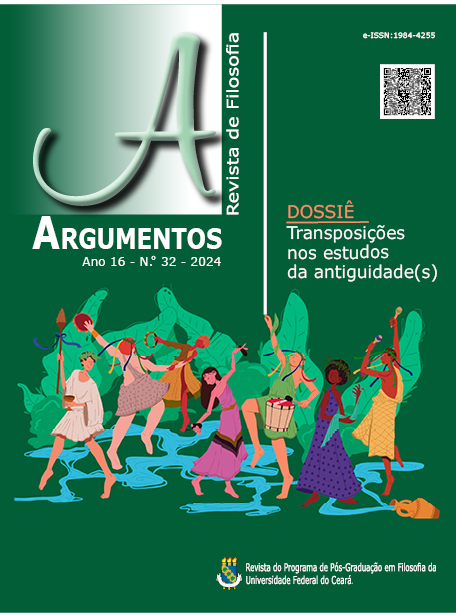The logic of being in Parmenides: between poetry and philosophy
DOI:
https://doi.org/10.36517/Argumentos.16.32.93698Keywords:
Parmenides. “what it is” (τὸ ἐόν). Λόγος.Abstract
Parmenides proposes a notion of φύσις somewhat different from the Milesian tradition, associating it no longer with some constituent such as water, earth, fire and air, but with “what it is” (τὸ ἐόν). With this, he favors the notion that φύσις is apprehended by thought (λόγος) and not by sensation, in order to be expressed in words based on the deduction of parameters for investigation. Our aim is to show that Parmenides uses a poetic language to guide the rules of philosophical language adopted by posterity, maintaining, however, the identity, arising from the archaic tradition, between φύσις and λόγος.
Downloads
References
BARNES, J. The Presocratic Philosophers. London: Routledge & Kegan Paul, 1982.
BOCAYUVA, I. Parmênides e Heráclito: diferença e sintonia. Kriterion: Revista de Filosofia, Belo Horizonte, v. 51, n. 122, jul./dez. 2010, p. 399-412.
BORNHEIM, G. Os Filósofos Pré-Socráticos. São Paulo: Cultrix, 1998.
BOSSI, B. What Heraclitus and Parmenides have in Common on Reality and Deception. Logos Anales del Seminario de Metafísica, n. 48, 2005, p. 21-34.
CASERTANO, G. A cidade, o verdadeiro e o falso em Parmênides. Kriterion: Revista de Filosofia, Belo Horizonte, v. 48, n. 116, jul./dez, 2007, p. 307-327.
CASERTANO, G. L’ambigua Realità del Discorso nel ‘Peri tou me ontos di Gorgia’ (com um aceno all’Elena). Philosophica, n. 5, 1995, p. 3-18.
CASERTANO, G. Os Pré-Socráticos. Tradução de Maria G. Gomes de Pina. São Paulo: Loyola, 2011.
CURD, P. Parmenides and after: unity and plurality. In: GILL, M. L.; PELLEGRIN, P. (Eds.). A Companion to Ancient Philosophy. London: Madison, 2006. p. 39-55.
DIELS, H.; KRANZ, W. Die Fragmente der Vorsokratiker. Band I. Ed. Bilíngue. 7ª ed. Zurich: Weidmann, 1954 [1901].
GALLOP, D. ‘Is’ or ‘Is Not’? The Monist, Oxford, v. 62, n. 1, 1979, p. 61-80.
KAHN, C. Retrospect on the Verb ‘To Be’ and the Concept of Being. In: KNUUTTILA, S.; HINTIKKA, J. (Eds.). The Logic of Being. Dordrecht: Reidel, 1986. p. 1-28.
MCKIRAHAN, R. D. Philosophy before Socrates: an introduction with texts and commentary. 2. ed. Indianapolis: Hackett, 2010.
MOUJÁN, F. R. Parmenides as a precursor of Plato’s dialectics. Revista Archai, v. 26, 2019, p. 1-26.
OWEN, G. E. L. Eleatic Questions. The Classical Quarterly, New Series, v. 10, n. 1, may./1960, p. 84-102.
PARMÊNIDES. Da natureza. Tradução, prefácio, comentários e notas de José Gabriel Trindade Santos. São Paulo: Loyola, 2002.
SANTOS, J. S. Parménides e a antepredicatividade. In: BULHÕES, F.; NAHRA, C. L.; SANTOS, J. S. Análise da episkepsis tôn onomáton de Antístenes. Sofia, v. 8, n. 1, 2019, p. 221-235.
SILVA, M. F. (Ed.) Natureza e Metafísica. Natal: EDUFRN, 2015.
SPINELLI, M. Dois temas em Parmênides: conhecimento, verdade e opinião / Ser, dizer e pensar. O que nos faz pensar, Rio de Janeiro, n. 13, 1999, p. 5-31.
WEDIN, M. V. Parmenides’ grand deduction: a logical reconstruction of the way of truth. Oxford: Oxford University Press, 2014.
Downloads
Published
How to Cite
Issue
Section
License
Argumentos magazine is licensed under an International Creative Commons Attribution License.
The Magazine uses CC BY inclusion
1) The authors retain the copyright granted to the magazine or the right to initial publication, with the work regularly licensed under the Creative Commons Attribution, which allows the sharing of the work with acknowledgment of authorship and initial publication in this magazine.
2) The authors are authorized to contract additional applicable contracts, for non-exclusive distribution of the version of the work published in this journal (for example, publication in the institutional repository or as a chapter of the book), recognition of authorship and initial publication in this journal.
3) Authors are authorized and encourage to publish and distribute their work online (for example, in institutional repositories or on their personal pages) at any time before or during the editorial process, as they can generate productive changes, as well as increase the impact and reference of published work.




.jpg)










._._3.png)
1.jpg)
._._._.png)
